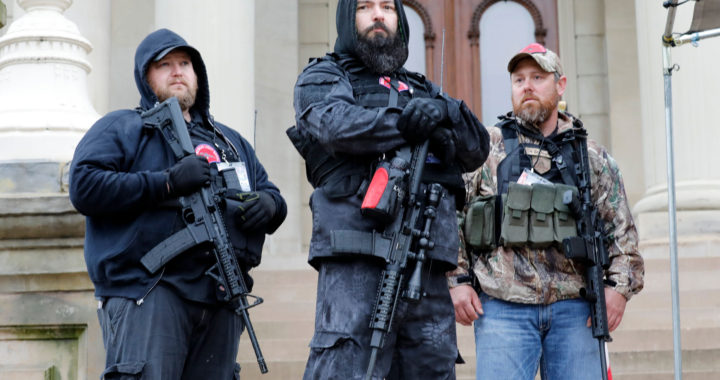It might be too late already.
Regardless of the outcome of Tuesday’s election, political violence encouraged and abetted by Donald Trump may be the longest-lasting legacy of his tragic presidency. We may already have passed the last exit ramp where we could have changed direction.
The signs of coming disaster are everywhere. At least four Americans have been killed during political protests during Trump’s presidency. ABC News has identified 54 instances of violence or threats of violence since 2017 that police reports or court documents say were motivated by the offender’s political beliefs. ABC News was unable to find even a single instance of court-documented violence or threats committed in the name of presidents Bush or Obama. Political polarization continues to climb, and research finds that partisans on both sides are increasingly likely to view their political opponents as enemies and traitors. When the stress of the pandemic, continued job losses, deteriorating race relations, and an unprecedented level of corruption are combined with skyrocketing gun sales, openly acknowledged efforts at voter suppression, and the increasing activities of armed “militias,” the likelihood of politically-motivated violence increases dramatically.
“The bases are loaded and all the components are there. It really only takes a spark to set off a significant amount of violence and once you have that violence, it becomes self-sustaining,” said David Kilcullen, the former counter-insurgency adviser to Gen. David Petraeus in Iraq and the author of five books on counter-insurgency and counter-terrorism.
The FBI, the Department of Homeland Security (DHS), and others concerned with domestic security and safeguarding elections have spelled out the danger. For more than a decade, the FBI has considered right-wing extremists to be the most serious domestic threat facing the United States. Yet it is difficult for federal law enforcement officials to act without top-level direction, or at least approval, and they are receiving no support whatsoever from Trump and his administration.
Trump, of course, is not solely or even mainly responsible for right-wing extremism, left-wing extremism, political polarization, racism, structural weaknesses in America’s economy, and other ills that beset us. Nor is all political violence caused by his supporters. But Trump is unique in his refusal to offer a steadying or calming influence. Not only does he not act to reduce enmity and discord, he believes that his political survival requires him to drive Americans apart, encourage hate, and threaten violence.
Marine General James Mattis, Trump’s first Secretary of Defense wrote that, “Donald Trump is the first president in my lifetime who does not try to unite the American people—does not even pretend to try. Instead, he tries to divide us.”
From his early campaign rallies, where he openly encouraged his supporters to beat protestors, to his calls for police to handle arrested persons roughly, to his repeated demands that the government imprison his political opponents, to his oft-expressed admiration for “tough guys,” to his suggestion that “second amendment people,” take care of his political opponents, to his bragging about federal agents committing extra-judicial murder, to his constant demonization of the press as “enemies of the people,” to his retweeting of memes that encourage violence, to his support for accused vigilante killer Kyle Rittenhouse, and to his contemptible refusal to condemn far-right racism and violence, Trump has actively worked to make America a more dangerous, more fractured, and more hateful nation. He and his enablers throughout the Republican Party remain cruelly indifferent to the long-term destruction his open support of violence will inflict on the nation.
Remarkably, in the context of the slime-fest that has been the Trump presidency, the growing threat of political violence is scarcely acknowledged. But while much of the Trump-inflicted damage might be reversed, politically-motivated violence may not be.
“I don’t know how you pull back from the brink here,” Kilcullen said. “At the end of the day, the least you’ve got right now is in the low tens of millions of people who’ve actively prepared to murder their countrymen and in many were looking forward to it. How does a Joe Biden electoral victory change that?”
“Probably the biggest issue is the president of the United States right now, who has portrayed himself as somebody who, you know, is not necessarily interested in calming the waters,” said Stephen Pomper, senior director for policy at the International Crisis Group. Pomper said that Trump “might actually court unrest in order to serve his political and personal goals.”
Kilcullen and other researchers agree that a critical first step would be action by the president to lower the political temperature.
“The only way you can avoid violence, and perhaps a constitutional crisis, is if the political leadership of both parties moves to de-escalate things and demobilize their bases,” said Harvard political scientist Steven Levitsky. “Trump is doing precisely the opposite of that.”
Earlier this week, Joe Biden told an audience in Pittsburgh that violence was unacceptable. “I’m going to be very clear about all of this,” the former Vice-President said, “Rioting is not protesting. Looting is not protesting. Setting fires is not protesting. None of this is protesting. It’s lawlessness. Plain and simple. And those who do it should be prosecuted. Violence will not bring change.”
But neither Trump nor other Republican leaders will make similar statements. “The most influential figures in the conservative movement—the commentators on Fox News and the Republican Party leaders—must come out and renounce this violence,” Levitsky said. “If they don’t, we are in terrible trouble.”
Most frighteningly, Trump is actively readying his supporters to reject the results of the election if he loses. Russ Travers, who served as acting director of the National Counter-Terrorism Centre (NCTC) until March this year, fears Trump’s incendiary rhetoric about the potential for a “rigged” election could lead to mass casualties if the President loses.
Like Kilcullen and others, Travers see no easy path that will lead us away from the precipice. “We’re going to have to grapple with this for years to come,” he said.
October 30, 2020
Sources:
https://www.vice.com/en/article/qjp48x/is-the-us-already-in-a-new-civil-war
https://time.com/5889425/political-violence-presidential-election/
https://abcnews.go.com/Politics/blame-abc-news-finds-17-cases-invoking-trump/story?id=58912889
